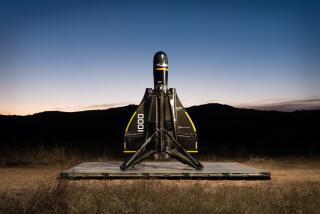Lockheed Accused of Cheating on Army Aircraft’s Flight Tests
- Share via
WASHINGTON — Lockheed officials illegally influenced test results of the Aquila unmanned surveillance plane that the company is building for the Army, according to an internal Pentagon investigation released Wednesday.
Lockheed representatives, during critical flight tests of the aircraft early this year, took advantage of the Army’s lack of controls over the tests and repeatedly inflated scores to make the plane look better than it was, the report by the Pentagon’s inspector general said.
Despite the cheating, the Pentagon report said, the Aquila fared poorly in the tests. The General Accounting Office, Congress’ investigative unit, said in an October study that the aircraft should not be built until serious quality and performance problems are solved.
A spokesman for Lockheed’s Austin (Tex.) division, which is building the Aquila, said late Wednesday that the company had not had a chance to review the inspector general’s report and would not comment. But the spokesman, playing down the allegations, said: “If we’re so influential, we should have passed the tests.”
An Army official said the service was preparing a response to the charges but that it had not been completed by Wednesday evening.
Another Army official, speaking on condition that he not be identified, said: “It doesn’t really matter because the thing is dead anyway.” Army budget officers have recommended cancellation of the troubled program, he said.
Contractor representatives are barred by law from participating in operational tests of weapons systems. The inspector general cited four “clear-cut” violations of the law in the February testing of the Aquila.
“There were inadequate controls to preclude the contractor from influencing the test, and the contractor took repeated advantage of the lack of controls,” the report said. “It is clear that the contractor extended his participation well beyond observer status at the scoring conferences, providing unsolicited comments and lobbied for less damaging scores.”
The report, released by the office of Sen. William V. Roth Jr. (R-Del.), said Lockheed’s involvement raises questions about the “independence and credibility” of the test process.
The study “paints a picture of Army test scorers who are no more than puppets on a string under the direction of the military contractor,” Roth said. “I have never seen such a shameful neglect of duty.”
The Aquila (Latin for “eagle”) is a pilotless, remotely guided surveillance plane designed to spot enemy targets and lessen the need for troops to conduct dangerous reconnaissance missions. It has had a troubled 13-year history in which costs have escalated to more than $2 billion from $563 million as the Army has asked it to perform increasingly complicated missions. As the system has become more complex, its ability to perform has deteriorated, according to the GAO.
The Aquila, a seven-foot-long, 260-pound craft, is designed to be launched from a truck and fly over enemy lines, relaying television pictures of enemy positions to guide ground commanders in directing air and artillery strikes. It is supposed to have a range of more than 30 miles and to stay aloft for three hours.
The drone underwent rigorous operational tests in February and failed to perform its mission in 98 of 105 flights. Its operators were able to identify only one in five moving targets and one in eight stationary targets, the GAO said.
More to Read
Sign up for Essential California
The most important California stories and recommendations in your inbox every morning.
You may occasionally receive promotional content from the Los Angeles Times.











